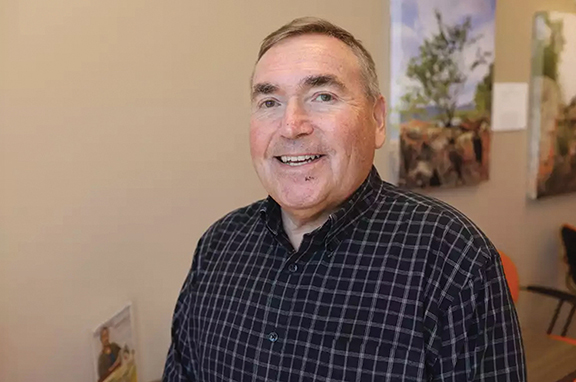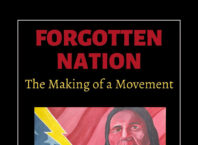
By Lee Egerstrom
It has finally happened. More than 170 years after the University of Minnesota was created on Native American lands, the University system now has a Native American on its governing Board of Regents.
On July 13, Minnesota Gov. Tim Walz and Lt. Gov. Peggy Flanagan announced the governor had appointed former University of Minnesota-Duluth professor and veteran Native American legal official Tadd Johnson as a Regent to represent Minnesota’s Eighth Congressional District.
A Boise Forte Ojibwe member, he fills a vacancy on the board. Former Regent David McMillan resigned the post and was appointed to fill a two-year role of interim chancellor at UMD. Duluth and its University campus are in the geographically large Eighth District of Minnesota.
Johnson, 65, is steeped in experience dealing with issues of Indian law, tribal sovereignty, and advocating for Native American opportunities within education, government and throughout American society and its economy.
While being named a Regent is an honor, he told The Circle, it is “a platform for me to continue what I’ve been doing.” In this capacity, he said, he can make sure “Native American Minnesotans … and from surrounding states … are not invisible at the U.”
Visibility has been a sensitive issue for Minnesota institutions in their relations with indigenous citizens. It came to light last year when the Minnesota Legislature passed over D. Brandon Alkire, a St. Paul attorney and Standing Rock Sioux member who sought election to the Board of Regents from the Fourth District.
Not coincidentally, Johnson has worked on improving University relations with Minnesota tribes. He formerly served as the University’s first senior director for American Indian Tribal Nations Relations.
In that capacity, he worked closely with University of Minnesota President Joan Gabel. He is credited with promoting Karen Diver, former Chairwoman of the Fond du Lac Band of Lake Superior Chippewa and a Native affairs adviser for President Obama, to serve in a similar role for University President Gabel. She assumed that position in May 2021.
While working as both an educator and a university administrator, Johnson also served as a senior adviser on government affairs for the Mille Lacs Band of Ojibwe.
In announcing Johnson’s appointment to the Board of Regents, Governor Walz said:
“With a background in leadership, education, and deep understanding of government on all levels, he brings a wealth of higher education expertise to this group.”
Lieutenant Governor Flanagan, who is a member of the White Earth Nation, gave Johnson’s appointment an indigenous perspective.
“Regent Tadd Johnson will give a voice to the many Native students who have been underrepresented for too long,” she said. “This historic appointment is made possible by the continued advocacy from tribes, community members, and leaders across the state to see representation at every level.”
Johnson explained himself and his goals in that announcement. “My father was an auto mechanic from Ely with a high school diploma who worked in the mines and my mother was a Native American whose dream of graduating from the University in the 1940s was cut short because there was no help for Native Americans,” he said.
“As a retired professor, I have first-hand knowledge of the struggles students face on a day-to-day basis, along with the faculty and staff who are devoted to teaching and nurturing them during their educational journey. I want to speak for the voices that are not heard often enough by the Regents; the students, the educators, Native Americans, rural Minnesotans and the working class. That’s where I come from and that’s who I am.”
He said he also wants to use his first-hand knowledge of Native Americans to influence research at the University. For instance, Native enterprises are among the largest employers in the state.
“That’s especially true in rural Minnesota,” he said. “I’ve seen figures that say tribes are the 14th largest employer in the state. I don’t know that for sure, but I would say they have to be among the 20 largest.”
Native enterprises have even greater economic impact beyond generating rural employment, Johnson said. Research does show these enterprises directly impact 70 percent of all businesses in rural Minnesota.
That includes truckers, grocery stores, gasoline stations, lodging and restaurants, various services and anyone else doing business with people coming through their towns. Most of this business traffic is driven by the gaming and hospitality industry enterprises tribes own and operate. But it also includes area businesses that provide services or products for the tribal ventures.
For the moment, Johnson said, he is undergoing “a learning curve” on how the Board of Regents operates and carries out its responsibilities. But from his past experience, Johnson’s elevation to the Board won’t require much on-the-job training.
He recently retired from serving as the university’s senior director of American Indian Tribal Nations Relations, was a full professor in the university system, and was director of Graduate Studies for the UMD’s Department of American Indian Studies.
The latter department’s programs have educated 4,600 students who have become Native American leaders within communities, business and services, he said. He was also director of the Tribal Sovereignty Institute at UMD.
Among his other background, Johnson is a graduate of the University of Minnesota Law School, is married, and the Johnsons have “two grown children and two dogs.”
The Walz-Flanagan announcement noted Johnson had been a tribal court judge for the Bois Forte Band of Chippewa, the Prairie Island Indian Community, the 1854 Authority that seeks to protect inter-tribal Chippewa rights in the 1854 ceded territories, and Leech Lake Appellate Courts.
In 1997, President Clinton appointed Johnson chairman of the National Indian Gaming Commission that regulates Indian gaming across America. He was staff director and counsel for the U.S. House of Representatives Subcommittee on Native American Affairs from 1990-1995, and in 1997 he became a trustee for the Udall Foundation, an agency of the federal government that works on strengthening government-tribal relations.
Away from public positions and education, Johnson was creator, co-host, and co-producer of the PBS “Native Report” for ten years and was the founding senior partner for Johnson, Hamilton, Quigley, Twait and Foley law firm in St. Paul.






